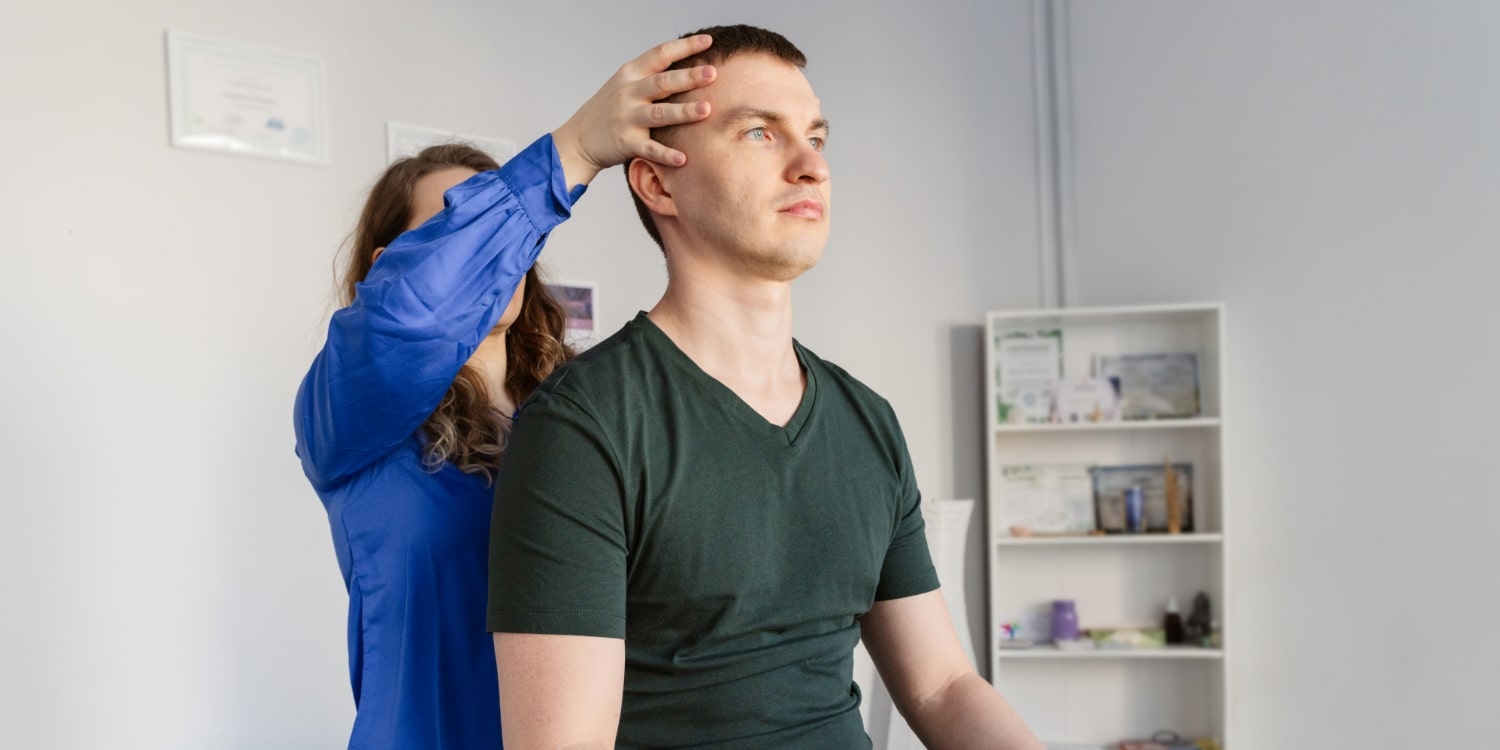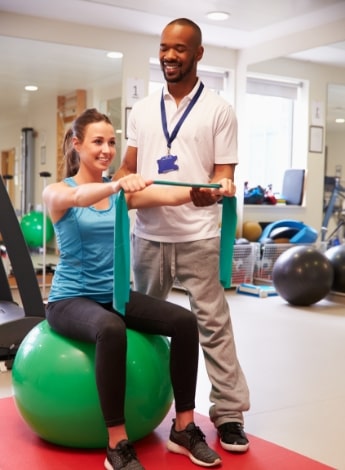
5 facts about persistent post-concussion symptoms

Katie Davies, Megan Hamilton, James McLoughlin and Emma Warner of the APA Neurology national group present five discussion points about persistent post-concussion symptoms.
1. PPCS is complex and may be influenced by multiple factors

Persistent post-concussion symptoms (PPCS) are symptoms that continue at least four weeks after concussion.
They may relate to the injury itself and/or pre-existing factors.
Symptoms include headache, dizziness, fatigue, memory problems, poor concentration, sleep disturbance, visual disturbance and mood changes such as depression, anxiety, irritability, stress and frustration.
While symptoms can relate to the effects of brain injury on cognitive, emotional and physical brain networks, they can also
be influenced by injuries to the neck (eg, whiplash) or the peripheral vestibular system (eg, post-traumatic benign paroxysmal positional vertigo) and by psychological trauma (eg, post-traumatic stress disorder).
It’s important to consider any pre-existing medical factors such as recovery from previous head injuries, learning disorders (eg, dyslexia), brain disorders (eg, attention deficit hyperactivity disorder, migraine or epilepsy), mental health issues (eg, anxiety or depression) and family medical history.
Patients with PPCS may present with a complex cluster of physical, emotional and cognitive problems, either primarily at the time of injury or as a secondary result of primary presenting symptoms.
If left untreated, these impairments can have a significant impact on quality of life, including academic performance at school (Lystad et al 2022), employment and sporting performance.
They may also lead to increased injury risk (including further concussion) and serious mental health issues (Fralick et al 2019).
2. PPCS requires an individual approach

Concussion physiotherapists take an individualised, patient-centred approach to differentiating between and addressing
disorders of the autonomic, visuo-vestibular and cervicogenic systems (Brown & Camarinos 2019).
The most common symptom following concussion is headache (Kerr et al 2016).
Physiotherapists can effectively treat cervicogenic headache (Schneider et al 2013) through manual therapy, exercise and behavioural education.
Post-traumatic headache and migraine are best managed with a multifaceted approach that can include physiotherapy, behavioural therapies, medication and education on sleep hygiene and stress management (Schneider 2019).
Vestibular dysfunction following concussion may involve central or peripheral system impairments (Brown & Camarinos 2019).
Vestibular-trained physiotherapists utilise customised exercise programs focused on oculomotor function, canalith repositioning manoeuvres for benign paroxysmal positional vertigo, gait and balance retraining through sensory motor integration and habituation exercises for motion and visual motion sensitivity (Brown & Camarinos 2019).
Because exercise intolerance is a physiological biomarker of concussion (Leddy et al 2021), individualised sub- symptom threshold aerobic exercise is prescribed by physiotherapists during concussion rehabilitation.
Leddy and colleagues (2021) propose that aerobic training increases parasympathetic autonomic tone, improves regulation
of cerebral blood flow and enhances neuroplasticity (ie, neuronal repair).
3. Education is key to treating PPCS

Conflicting information about concussion in the community creates anxiety in patients and their families regarding persistent symptoms post-concussion and the management of those symptoms (Teel et al 2022).
Physiotherapists can play a key role in education about PPCS.
It is important for clients and their families to understand that ‘persistent’ symptoms doesn’t mean long- term symptoms.
They are usually temporary and treatable.
With assessment and management from a multidisciplinary team including physiotherapists, most patients make a good recovery and ‘the majority of children and adolescents return to school by 10 days without academic supports’ (Davis et al 2024).
Physiotherapists can also educate each other.
Management of PPCS is complex.
From acute management to rehabilitation and return to participation, it brings together several different aspects of the physiotherapy skill set, including vestibular, neurological and cervical experience
and exercise prescription.
To optimally manage this complex cohort of patients, we need to work collaboratively and share knowledge.
Within the multidisciplinary team, physiotherapy assessment will not only guide our treatment but will help the team determine how much stimulation our patients should be exposed to each day.
In making recommendations on activity and participation, we can educate the wider multidisciplinary team on pacing the patient and managing the non-physical symptoms of PPCS.
4. Physiotherapists play a significant role in PPCS rehabilitation

Rehabilitation physiotherapists work holistically when helping clients with PPCS achieve their participation goals.
They incorporate strategies that look beyond the 24-hour window to consider the weekly picture and how the patient’s symptoms are affecting all aspects of their life.
They can provide education on pacing, fatigue management, sleep hygiene and the effects of physical and cognitive load on patients’ return to participation in daily activities.
While the focus of rehabilitation after sports- related concussion is often on return to play, physiotherapists working with patients with PPCS from many different causes (eg, workplace injuries, motor vehicle accidents and falls) can commence early, customised treatments to manage the presenting impairments.
This ultimately improves function and enables the fulfilment of return- to-participation goals, no matter what stage of life a patient may present.
After assessing symptoms through various screening tools and testing protocols, physiotherapists can recommend onward referrals to other health and medical specialities.
As part of the multidisciplinary team, physiotherapists are well positioned to liaise with other members of the patient’s treating team, which may include neurologists, neuropsychologists, cardiologists, sports physicians, exercise physiologists, optometrists, occupational therapists, coaches and other health professionals (Moore et al 2023).
5. Physiotherapists are leading research into PPCS

Physiotherapists are driving research into concussion recognition and management, which has increased exponentially in the past decade, providing strong evidence to support the role of physiotherapists in the multidisciplinary team managing patients with PPCS.
Early identification and management of vestibulo-oculomotor dysfunction has been shown to reduce the recovery time from concussion and to prevent the persistence of symptoms (Babula et al 2023, Whitney et al 2020).
While the profession has made a significant contribution to updating evidence around the world, there are still areas requiring more research and clinicians across Australia are actively working and conducting research in this area.
Future directions of concussion research include the identification of those at risk for developing persistent symptoms;
the physical presentation of patients with concussion and links to symptom profiles; recognition and management of concussion in para-athletes, women and children in sport; the consequences of falls in older people; whiplash and cervicogenic symptoms; and concussion following motor vehicle and workplace accidents.
Quick links:
- References
- Infographic poster of this article.
>>Katie Davies APAM is the principal physiotherapist at Neurological Rehabilitation Group in Melbourne, a neurological and vestibular private practice. Katie has been managing this complex presentation since starting at the practice in 2012. She is actively involved in concussion research in adults and children.
>>APA Research Physiotherapist Megan Hamilton MACP is the principal physiotherapist at Concussion Central, a neurological private practice focused on management of concussion and vestibular conditions. Megan was a founding member of the Epworth Concussion Clinic and has completed her master’s degree by research in traumatic brain injury.
>>APA Neurological Physiotherapist James McLoughlin MACP has degrees in physiotherapy and clinical neuroscience and 25 years of clinical experience in neurological/vestibular rehabilitation. James is the director of Advanced Neuro Rehab and founding director of Your Brain Health. He is an Associate Professor at Flinders University.
>>APA Neurological Physiotherapist Emma Warner MACP is a lecturer in physiotherapy at Griffith University and works clinically in her neurological and vestibular private practice in Brisbane. Emma has been managing clients with concussion for more than a decade and is currently researching in this field through Griffith University.
© Copyright 2024 by Australian Physiotherapy Association. All rights reserved.





